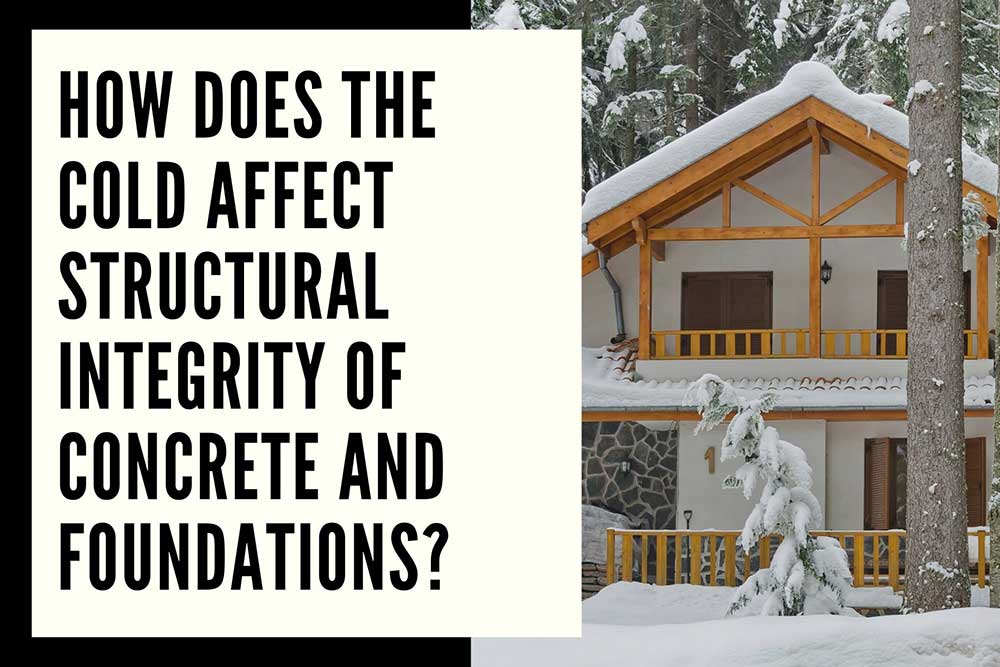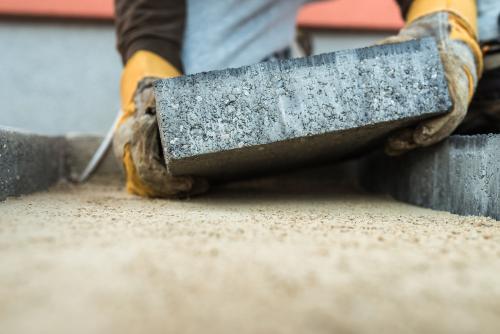
Because of the size of the structure, the foundation of most commercial buildings support an immense amount of weight. Foundations can fail for various reasons, including damage from storms such as hurricanes and events like earthquakes. However, many property owners are unaware of how the cold affects the structural integrity of concrete walls and foundations.
Does Weather Affect Concrete and Foundations?
Cold weather can significantly impact foundations, sidewalks, and other concrete structures and cause them to develop small fissures over time. These breaches typically start out being so small the fissures are undetectable to the naked eye and grow over time into larger gaps and cracks. Dropping temperature and extreme cold can exacerbate these preexisting spaces in concrete. Rains and snow can infiltrate the spaces as well, causing greater expansion and more severe damage. Here are the major ways of how cold can damage the structural integrity of concrete walls and foundations:
Rain and Flooding
If there are breaches in the concrete or hydrostatic pressure, rainwater will penetrate the gaps,cracks and seep through the foundation to allow water to enter the basement. Once in the basement, water can then infiltrate into cracks in the concrete floor or through a rising water table find its way under the structure. Unless it dries out completely, this can cause damage to the interior of the foundation. Additionally, water can erode the soil under the foundation and make it unstable enough to possibly cause it to shift when the structure and surrounding soil begin to dry out or contract in cold weather. Then, when the weather warms again, the soil and concrete expansion can cause the foundation to collapse into weakened areas.

Freezing and Ice
Foundation damage can happen before temperatures drop to freezing and the likelihood of foundation damage increases anytime the temperature dips below 40 degrees Fahrenheit for at least three consecutive days. This can cause any water sitting inside the foundation to expand and crack the concrete.
Soil Expansion
Soil is constantly absorbing water from storm runoff, lawn watering, and snowmelt. The soil expands as it absorbs water and places pressure on the foundation that can cause the foundation walls to bow, and cracks can develop from the pressure.
Frost Heaves
Frost heaving is the movement of the soil due to the formation of layers of ice, known as lenses, within the ground. The soil expands when freezing temperatures hit, and this expansion of frozen soil is referred to as frost heaves. Because the ground freezes from the top down, the three following conditions must be present for frost heaves to occur:
- Freezing temperatures
- Water in the soil
- Frost-susceptible soil
When the ground freezes, melts and refreezes, it causes the soil to expand and contract, and this is known as the “frost heave cycle.” Violent frost heaves can move a structure a few inches or a couple of feet depending on how much water the soil holds and how cold the temperatures get. The colder the temperatures are, the deeper the cold will penetrate the ground and the greater the soil’s heaving. Ultimately, this cycle will eventually have a negative impact on your foundation as it places extreme pressure on the foundation walls, creates soil instability, and leads to more problems.
Concrete and Foundations Damage Prevention
Foundations can also be damaged when the ice lenses melt entirely. Because the frozen ground around the foundation is obviously harder than the unfrozen ground further down, the frozen ground holds the foundation in place. As the ground continues to freeze downward, it causes the soil deeper down to push up on the top layers of the frozen earth. This causes the foundation to be pulled upward and creates gaps and spaces under the foundation, and results in the ground under the foundation shifting into the new spaces. Eventually, the unfrozen ground under the foundation freezes and holds the structure in place. When the ground thaws, the foundation then settles into the space under the structure, but the foundation does not settle back down to the original position because the space is partially filled.

Preventing Frost Heave Damage
While concrete foundations are engineered to withstand weather, wear, and tear, it is crucial to have your foundation professionally maintained to help prevent damage and catch minor problems before they manifest into larger headaches. Commercial property owners can protect against frost heaving by having a reputable commercial masonry contractor install a one-inch thick layer of polystyrene insulation from the ground up. This will help prevent frost from moving under the surface of the ground around the foundation and causes the heaving to push out away from the building, helping the ground around the foundation to remain stable. Because of the hardening of the ground in colder weather, foundation maintenance and repairs are best performed in the spring by a commercial concrete repair company.
Epic Masonry Restoration | Commercial Masonry
It is important to note that it is not just the cold, but the continual expansion from heat and then the contraction from the cold that causes the major damage. Each time concrete goes through this cycle, the cracks and gaps become larger. This can cause the foundation to eventually fail if the breaches in the structure begin to weaken enough to crumble. Once a foundation begins to fail, it requires a contractor with professional training and equipment to repair the damage properly.
Repairing your concrete foundation properly is crucial for getting the most out of your investment. Epic Masonry Restoration has years of experience repairing damaged foundations on commercial buildings in the Minneapolis and St. Paul area. Their technicians are experts at restoring the structural integrity of your foundation and can provide solutions that will last for the life of your concrete. Epic Masonry Restoration has experience in concrete repair in Minneapolis and St Paul and concrete waterproofing in St Paul and Minneapolis (redundant city naming?) and can combine compatible repair products with advanced concrete restoration methods. Visit them online at epicmasonryrestoration.com or give them a call at 612-353-4646.
